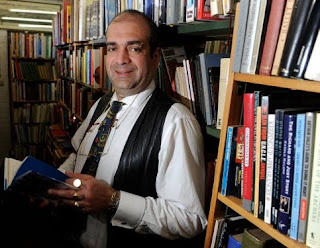Studies show that a third of the possessions in a typical UK home aren't used. Not only that but many people have forgotten they owned the items in the first place.
Garages are used more and more not for housing cars but storing all those items we can't fit into the house.
Jenny and I are pretty ruthless about getting rid of unwanted items, but even so there are still a few surplus items that could swiftly be disposed of. But it's easy to find bogus reasons for hanging onto things.
When I met Jenny I was living in a tiny bedsit, and I simply couldn't buy very much because there was absolutely no storage space. As we moved up the property ladder to bigger flats and then bigger houses, of course we acquired lots of bits and pieces to fill the extra room. So if we got rid of too much there would just be a lot of strange empty spaces.
Our biggest possession is books. We must have at least a thousand but we chuck our very few because we fully intend to re-read most of them. In reality most of them don't get re-read, they just sit there gathering dust or sometimes they're so old they simply fall to pieces.
Some of you will recall that my mother was a chronic hoarder. Luckily I haven't inherited that particular trait.














